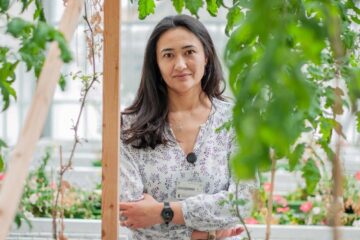Researchers Plan to Connect Petrol Stations to Natural Gas Supply to Fuel Hydrogen Powered Cars

Researchers at the University of Warwick’s Warwick Process Technology Group are leading a programme called “Hydrofueler” to develop technology to connect petrol stations to the normal natural gas supply to fuel hydrogen powered vehicles. The 2.8 million euro EC funded three year research programme has already drawn interest from Exxon Mobil, and BMW.
One of the problems with using hydrogen powered cars is how do you keep their fuel cells supplied with a ready source of hydrogen? The Warwick researchers believe that much of the necessary infrastructure already exists – the new technology can be fitted to pre-existing filling stations who will then use it to produce hydrogen from the normal pre-existing natural gas pipeline supply system.
To do this however you need to resolve a number of problems. In particular how to produce the hydrogen from that natural gas in a confined space, using a simple automated remotely controlled process. Obviously very large scale industrial processes already exist to produce hydrogen from natural gas but these technologies cannot be scaled down to compact size needed to be practical in a filling station context and the costs of using these processes would be prohibitive.
The new University of Warwick research solves these problems by a combination of innovative heat exchange technology, novel ways of managing and using heat and pressure within a reactor, novel compact plated reactor technology, and the use of new coated nanocrystaline catalysts to greatly increase the efficiency of the reactions. These techniques will allow the researchers to develop a reactor around the size of three average office desks which can be used in the confined space available on pre-existing petrol station forecourts and which will produce hydrogen at a cost effective rate and without any emissions problems.
The research will draw on technology developed by University of Warwick Process Technology Group researcher Dr Ashok Bhattacharya, and the following research partners: Chart Heat Exchangers Ltd in Wolverhampton, England; France’s Commissariat a l’Energie Atomique; Norway’s Foundation for Technical and Industrial Research in Strindveien (SINTEF); The National Research Council of Italy; and catalyst specialists Dytech in Sheffield, England.
Another advantage of the technology proposed by the Warwick team is that process employs a number of stages at which hydrogen reaches different rates of purity. This is ideal, as different sorts of fuel cell will require different mixes of hydrogen. Thus the technology proposed can in one reactor simultaneously produce what one might describe as 2, 3 and 4 star hydrogen!
The researchers are also considering using the technology to carry out hydrogen production within car engines and also as a possible replacement for large industrial hydrogen production processes.
Media Contact
More Information:
http://www.communicate.warwick.ac.uk/index.cfm?page=pressrelease&id=887All latest news from the category: Transportation and Logistics
This field deals with all spatial and time-related activities involved in bridging the gap between goods and people, including their restructuring. This begins with the supplier and follows each stage of the operational value chain to product delivery and concludes with product disposal and recycling.
innovations-report provides informative reports and articles on such topics as traffic telematics, toll collection, traffic management systems, route planning, high-speed rail (Transrapid), traffic infrastructures, air safety, transport technologies, transport logistics, production logistics and mobility.
Newest articles

How the Immune System Learns from Harmless Particles
Our lungs are bombarded by all manner of different particles every single day. Whilst some are perfectly safe for us, others—known as pathogens—have the potential to make us ill. The…

Biomarkers identified for successful treatment of bone marrow tumours
CAR T cell therapy has proven effective in treating various haematological cancers. However, not all patients respond equally well to treatment. In a recent clinical study, researchers from the University…

She deciphers how tomato roots communicate
Ora Hazak has always been fascinated by plants and is studying the signals that roots send to the rest of the organism. She aims to understand this communication in order…





















